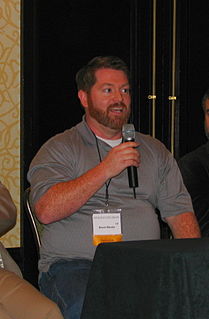Цитата Уильяма Стайрона
Я думаю, что одна из неотразимых тем художественной литературы — это противостояние добра и зла.
Связанные цитаты
Мое изучение Ганди убедило меня в том, что истинный пацифизм — это не непротивление злу, а ненасильственное сопротивление злу. Между этими двумя позициями огромная разница. Ганди сопротивлялся злу с такой же энергией и силой, как и насильственный сопротивляющийся, но истинный пацифизм — это не нереалистичное подчинение силе зла. Это скорее мужественное противостояние злу силой любви. . . .
Истинный секрет естественного добра заключается в признании соперничающих прав Пар противоположностей; нет такой антимонии, как между Добром и Злом, а есть только равновесие между двумя крайностями, каждая из которых есть зло, когда доведена до крайности, и обе из которых порождают зло, если их недостаточно для равновесия.
В этом мире нет ни абсолютного добра, ни абсолютного зла, — сказал мужчина. — Добро и зло не являются фиксированными, стабильными сущностями, а постоянно меняются местами. Добро может превратиться в зло в следующую секунду. И наоборот. Таков был уклад мира, который изобразил Достоевский в «Братьях Карамазовых». Самое главное — поддерживать баланс между постоянно движущимся добром и злом. Если вы слишком склоняетесь в любом направлении, становится трудно поддерживать настоящую мораль. Действительно, баланс сам по себе является благом.
Когда кто-то однажды принял и впитал Зло, оно уже не требует непригодности средств. Скрытые мотивы, с помощью которых вы поглощаете и ассимилируете Зло, не ваши собственные, а мотивы Зла... Зло — это то, что отвлекает. Зло знает о Добре, но Добро не знает о Зле. Знание себя есть только у Зла. Один из способов, которыми обладает Зло, — это диалог... Злу нельзя платить в рассрочку — и всегда пытаются.







































